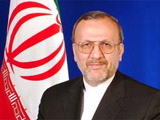|
|
TODAY.AZ / Politics
Iran offers UN new nuclear access
24 November 2006 [00:05] - TODAY.AZ

Mohamed ElBaradei said he hoped Iran's move would begin a series of measures that would clear suspicions over its nuclear programme.
The IAEA has however rejected an Iranian request for help in building a heavy-water nuclear reactor at Arak.
The US fears Iran could use the reactor to make fuel for a nuclear weapon.
Plutonium released as a by-product in a heavy water reactor can serve as a substitute for highly-enriched uranium in constructing a nuclear device.
Iran has also repeatedly rejected demands to halt its uranium enrichment work.
The UN Security Council remains deadlocked over Iran's announcement that it will not suspend uranium enrichment as a precondition for talks over its nuclear programme.
Iran has dismissed US suspicions that it is building a bomb and insists its nuclear work does not have a military aspect.
According to Mr ElBaradei, Iran has agreed to let International Atomic Energy Agency (IAEA) inspectors take environmental samples from equipment at a former military site at Lavizan.
Iran has also said it will give the UN access to records from a uranium enrichment plant in Natanz.
Mr ElBaradei welcomed the moves but said Iran needed to show more transparency over its nuclear programme.
He told the AFP news agency that Iran needed to give "a full explanation of the development of its nuclear programme from start to finish".
Iran, he said, needed "to openly corroborate this explanation with evidence, including records and access to relevant locations and individuals involved".
According to the BBC's Pam O'Toole, Iran's latest offer may be trying to show it is co-operating with the IAEA - but western countries will probably argue more needs to be done if it is to avoid the threat of sanctions.
Diplomats meeting at IAEA headquarters in Vienna, Austria, rejected Iran's request for help in building the heavy water reactor.
BBC correspondents say the IAEA has left open the possibility of reconsidering Iran's request in the future.
Iranian Foreign Minister Manouchehr Mottaki said work on the Arak reactor would continue, regardless of the IAEA decision.
"It is the duty of the IAEA to help. If they help, we will appreciate it. If not, we will do it on our own," he said.
Iran says the heavy-water plant at Arak will help it make radio isotopes for medical purposes.
The US fears the reactor at Arak, when complete, could produce enough plutonium to build one bomb every year. BBC
URL: http://www.today.az/news/politics/33012.html
 Print version
Print version
Connect with us. Get latest news and updates.
See Also
- 04 December 2024 [18:38]
Western Azerbaijan Community hosts bilateral meeting ahead of International Conference - 04 December 2024 [15:40]
Cavusoglu visits Community, reaffirms Türkiye’s support for Azerbaijan’s right of return - 04 December 2024 [15:25]
President of Tajikistan makes phone call to President Ilham Aliyev - 04 December 2024 [12:16]
Macron versus the French: Who will send whom? - 04 December 2024 [11:16]
Armenia forces to talk about the deportation of Azerbaijanis - 04 December 2024 [11:06]
Ali Asadov and Mikhail Mishustin discuss key bilateral issues in Baku - 04 December 2024 [10:22]
Azerbaijani Foreign Minister Jeyhun Bayramov visits Malta - 04 December 2024 [10:00]
IDPs return to reconstructed Shusha under Great Return Program - 03 December 2024 [15:24]
Azerbaijan discusses strengthening cooperation at 28th ECO Foreign Ministers' meeting - 03 December 2024 [14:22]
Azerbaijan elected as chair of UNCCD regional group and COP16 Bureau member
Most Popular
 Armenia forces to talk about the deportation of Azerbaijanis
Armenia forces to talk about the deportation of Azerbaijanis
 How the West betrayes and continues to betray Georgia and Ukraine
How the West betrayes and continues to betray Georgia and Ukraine
 "Armenian heritage" exists as long as it's funded – how CHW deceives the world.
"Armenian heritage" exists as long as it's funded – how CHW deceives the world.
 Azerbaijan discusses strengthening cooperation at 28th ECO Foreign Ministers' meeting
Azerbaijan discusses strengthening cooperation at 28th ECO Foreign Ministers' meeting
 Armenian whining and the Azerbaijani magic wand
Armenian whining and the Azerbaijani magic wand
 Stupidity versus cowardice: a new round of confrontation between Pashinyan and Aghazaryan
Stupidity versus cowardice: a new round of confrontation between Pashinyan and Aghazaryan
 Milli Majlis hosts public hearing on return to Western Azerbaijan
Milli Majlis hosts public hearing on return to Western Azerbaijan
